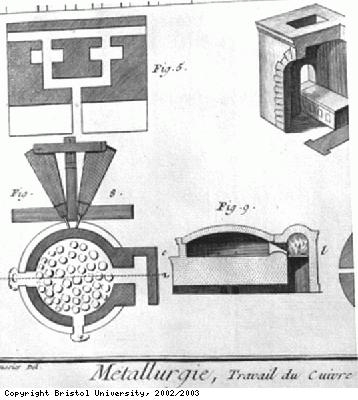How Slavery Developed
Goods to trade
Bristol and the west country had to produce goods in order to trade with African tribal chiefs, goods to exchange for people captured in war or kidnapped to sell as slaves.
Brass goods were of particular value to the African chiefs. Brass pots and pans were used for cooking, washing and decoration. Brass bars could be melted down and made into beautiful artefacts by African craftsmen. Later, as the trade became more established, guns and gunpowder were much in demand for trading. Businessmen in Bristol and the surrounding areas produced or bought in goods for trading with Africa. Because of this, many industries developed. Ships had to be built and maintained. All the items needed on the voyage to repair the ship like sails, ropes and rigging had to be produced. Food for the crew and the slaves and barrels for water had to be bought. Many people were employed, from sailors to customs officers.
Wealth from the ‘Africa trade’ helped to fund the building of large private houses and other notable buildings in Bristol, including the theatre, the library, the Infirmary (hospital), the Exchange and the Merchant’s Hall.
The population of Bristol grew from around 20,000 in 1700 to 64,000 in 1801.
People came to Bristol to find work. Many of these found themselves living in the poorest slums in the city and working in the industries which supplied the slave trade or developed from it, such as sugar processing.

 Bristol’s merchants
Bristol’s merchants Examples of cargoes
Examples of cargoes Abolition
Abolition Rebellion
Rebellion Sugar Plantations
Sugar Plantations African heritage
African heritage The voyage
The voyage ‘Buying’ the slaves
‘Buying’ the slaves Bristol ships go to Africa
Bristol ships go to Africa Goods to trade
Goods to trade

